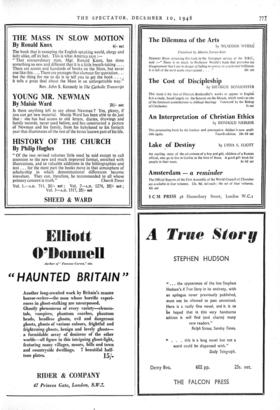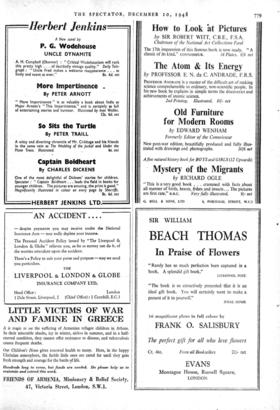Where Shall John Go ?
MR. Ross and Mr. Minton went to Corsica in the summer of 1947. They travelled by bus, by train and once rather angrily on foot, to nearly all the towns and villages of any size in the island. They slept in raffish inns and hotels, were harried by insects, bathed, dutifully inspected the few historical sights, inhaled the atmosphere of lassitude and ennui, inquired into the lives of the inhabitants, looked for its " mainsprings " but found them wanting, and were pleased by the traditional Corsican songs. As they journeyed Mr. Minton painted and Mr. Ross observed, wrote poems and noted his impressions in a journal. Time Was Away, a handsomely printed book bound in chrome-yellow buckram, is based on this journal, kept from day to day, and altered as little as possible, the author tells
; "in order to preserve thejaunediacir of sensation." The journal s interspersed with short lives of Corsican heroes, and concludes
ith some of Mr. Ross's poems. travelled The whole island," writes Mr. Ross, " can be thoroughly travelled in a month, there is very little human activity beyond what h easily observed, and, in fact, making a journey through the Wonderful inanimate landscape is like seeing a• succession of -stage sets, but never any drama." The book in consequence has some of this quality. The greater part is devoted to descriptions of town and landscape, and they are very accomplished descriptions. Mr. Ross has the sharp eye of the landscape poet—the word landscape Should not be read only in the sense of a prettified view—for noting the common factor between two sense experiences which makes a good simile. He describes an afternoon when the sea " frilled over the dun sand, lost where the pines stood up like a green hairbrush, d the heads of bathers were olives thrown into the waves." This only one of many perceptive images. The impersonal, almost to quality of the book is heightened by the fact that the uthor never uses the first person, either singular or plural. It is ever he and his companion who go, eat, trudge or drive, but the
or recreating the atmosphere of immobility which he finds such a oad that goes and the bus that leaves. This is perhaps a device feature of the island. That and the taste of Corsicans for everything thoddy and modern, for jazzy decorations, exhausted dance tunes and dreams of Hollywood luxury, are what strikes his critical, rather disdainful, sensibility first and foremost.
Unfortunately the effect of so much description is inevitably monotonous, and the comparisons, often so apt, tend to lose their force by reason of their similarity. Beetles look like tanks, birds Wheeling in the sky are revolutionaries, people waiting on the shore are refugees, as if war and the adventure film were the only source bf imagery for a contemporary writer. And at times one feels that Mr. Ross is determined not to be impressed. When he arrives at Corte, which in Mr. Minton's drawing rises gracefully above a river and a grove of fig trees, he only sees the " turret of the church trying to push itself clear of the filth," and asks, " What is there to say about a town once history has dried up in it ? " Well, what is there to say about Pompeii, about Paestum, Palmyra or Karnak ?
Mr. Ross has an odd fondness for vague references to History and tine. History is sometimes the past, and sometimes just life in eneral. Time is never in Corsica until the travellers return to Ihlarseilles, when suddenly Corsica is the only place where time is still going quietly on. One longs for an excited response, for more life and less definition. His detachment is a little blasé, a little Superior, and even a little inhuman. If only he would relax and admit that the last word cannot be said-in a volume about any place. However, one cannot dispute with a traveller his own impressions, and anyone contemplating a holiday in Corsica should read Time Was Away, if only as a precaution against disillusion. The author may see things too often through the eyes of Mr. Graham Greene, but that at least is a change from seeing them always in the manner of South Wind.
Mr. Minton's drawings belong to the neo-romantic school. He xpresses the contrasting luxuriance and aridity of the Mediterranean landscape with feeling and enjoyment. When they are not clotted with too much black his drawings have a pleasant ninetyish look, as if Aubrey Beardsley had gone on holiday with Mr. Graham















































 Previous page
Previous page